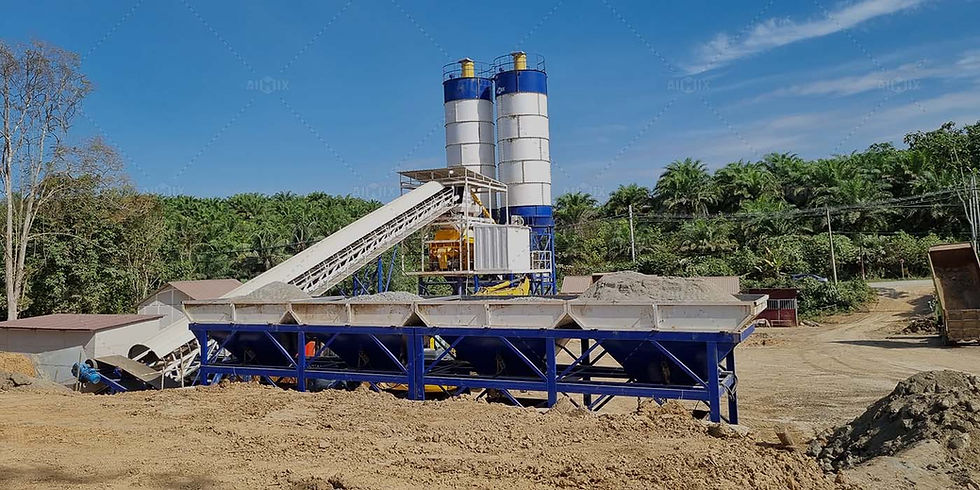Which Concrete Batching Plant Can Efficiently Produce 60 m³/h for Medium-Sized Road Projects?
- aimixindonesia5
- Jul 6
- 3 min read
Choosing the right concrete batching plant is critical for the success of medium-sized road construction projects. When the required concrete output is around 60 m³ per hour, the concrete batching plant must not only deliver stable production but also ensure efficiency, mobility, and easy operation. In this article, I will guide you through the best solutions and help you find the most suitable concrete mixing plant for your needs.

Understanding the Concrete Needs of Medium-Sized Road Projects
Medium-sized road projects usually demand continuous concrete supply to keep up with the paving process. Typically, these projects require 50 to 70 m³ of concrete per hour. A batching plant that can steadily produce 60 m³/h perfectly matches this production scale.
But meeting capacity is not the only factor. Contractors also care about plant mobility, installation time, mixing quality, and maintenance simplicity. Selecting the right plant should balance all these aspects.
Why 60 m³/h Is the Right Capacity for Medium Projects
Many contractors working on road projects need daily production between 400 to 600 m³. A 60 m³/h plant can easily meet this target with 8 to 10 hours of daily work. It reduces the risk of delays and ensures enough supply for continuous paving. That’s why many companies prefer this capacity.
Now, let's look at which batching plant types can efficiently provide this output while offering other practical advantages.

Stationary vs. Mobile Batching Plant: Which Is Better?
Before choosing a specific model, you need to decide between a stationary or mobile type. Both have their advantages, but the right choice depends on your project location and schedule.
Advantages of Mobile Concrete Batching Plants
If your road project involves moving along the road or working in multiple short-term sites, a mobile concrete batching plant for sale is a better option. It is easy to transport and quick to install. Mobile batch plant can usually require only 3 to 5 days for installation, which saves time and labor costs.
In addition, mobile plants are equipped with compact designs. All key systems like the mixer, aggregate batching machine, and cement silo are integrated into a mobile unit. This design ensures stable performance even when frequently relocating the plant.
When to Choose a Stationary Concrete Batching Plant
On the other hand, if the road project is long-term and in a fixed location, a stationary plant can be more cost-effective. It provides excellent mixing efficiency and longer service life. Stationary plants are often chosen when you need high precision and larger storage capacity for aggregates and cement.
Although installation takes more time, the production stability and lower long-term cost make stationary plants attractive for contractors who prioritize reliability over mobility.

Recommended Plant Models for 60 m³/h Concrete Production
After understanding your project type, you can consider specific plant models that suit the 60 m³/h output. Below are two popular options:
AJY-60 Mobile Concrete Batching Plant
The AJY-60 is a fully mobile batching plant with a rated capacity of 60 m³/h. It features twin shaft mixers that guarantee uniform and high-quality concrete. The plant is mounted on a trailer, which allows fast relocation. It is suitable for road projects that require quick setup and frequent movement.
AJ-60 Stationary Concrete Batching Plant
The AJ-60 stationary plant also offers a 60 m³/h capacity but is designed for fixed sites. It comes with a belt conveyor system that ensures continuous material feeding. The plant provides precise weighing and consistent mixing performance. It is a reliable choice for contractors focusing on large-volume, stable production over a longer period.
Both models meet medium-sized road project demands but address different project conditions. Carefully selecting between these two can directly impact your project efficiency and costs. Get the harga batching plant directly from the batching plant supplier.

Factors to Consider Before Making a Final Decision
Besides capacity, you should also evaluate a few practical factors:
Project Duration: Mobile plants are ideal for short-term projects, while stationary plants fit long-term operations.
Site Space: Mobile plants need less space. Stationary plants usually require more layout area.
Concrete Quality: Both plant types can ensure good concrete, but stationary plants may offer slightly better precision.
Relocation Needs: Mobile plants save time and transport costs if frequent relocation is required.
Balancing these considerations helps you find the right batching plant that fits both your technical and business needs.
Conclusion: Find the Best Concrete Batching Plant for Your Road Project
When working on medium-sized road projects, selecting a concrete batching plant that can efficiently produce 60 m³/h is essential to keep your construction on schedule. If you need flexibility and fast movement, the AJY-60 mobile concrete batching plant is an excellent choice. If you prefer stable, long-term production, the AJ-60 stationary batching plant will serve you well.
We are here to help you choose the best solution based on your project requirements. Contact us now to get expert advice and a customized quotation. Let’s work together to keep your project running smoothly!


